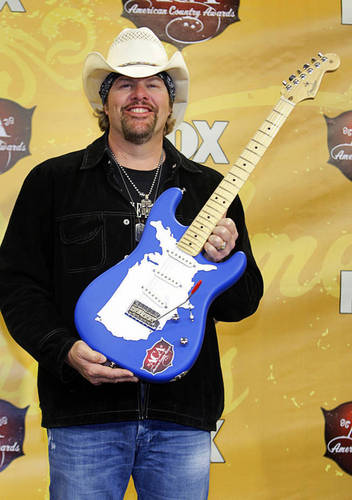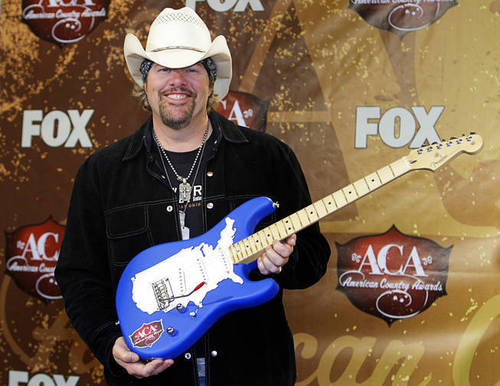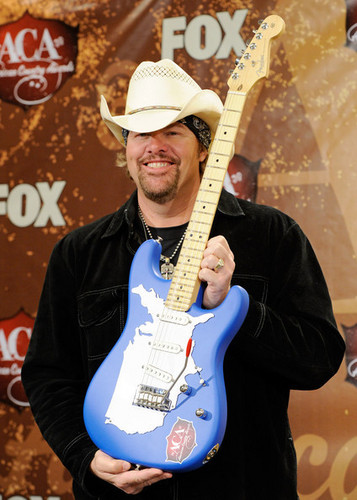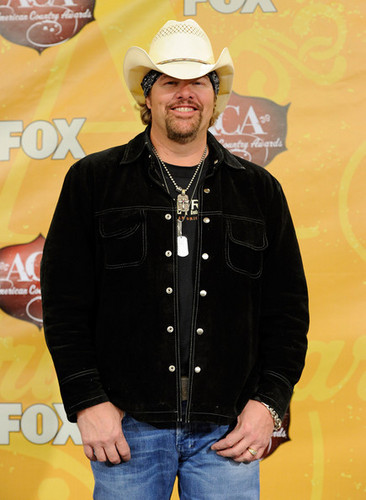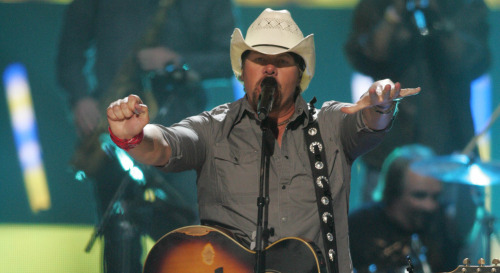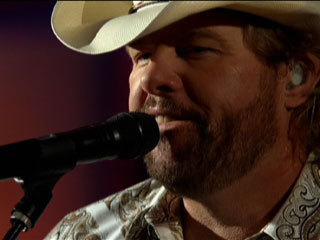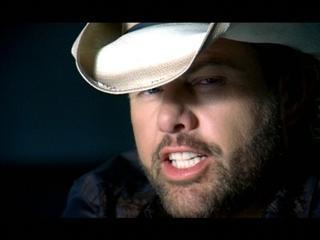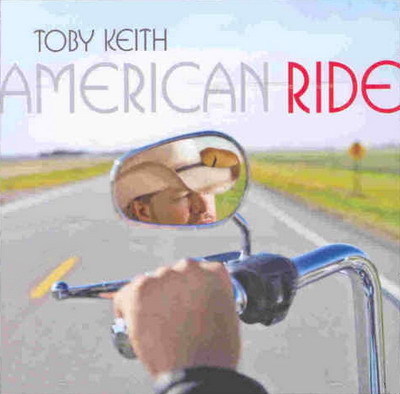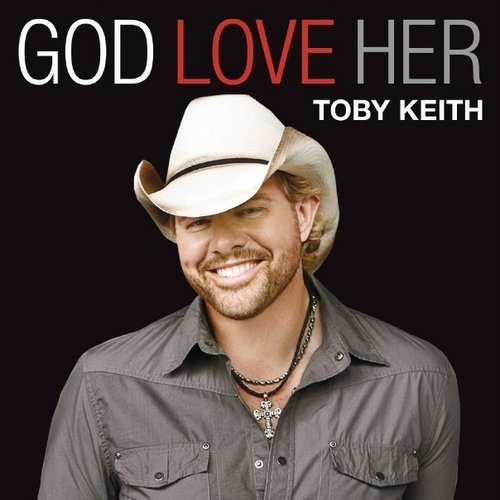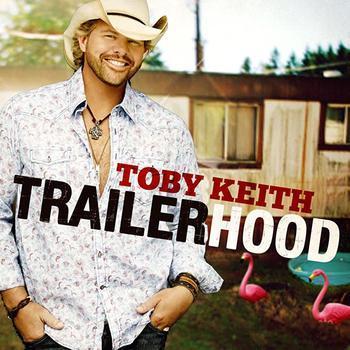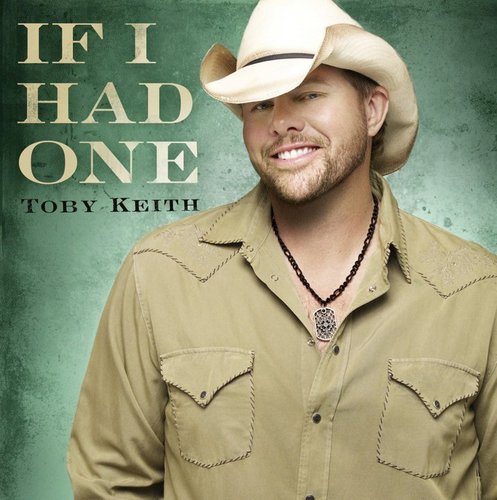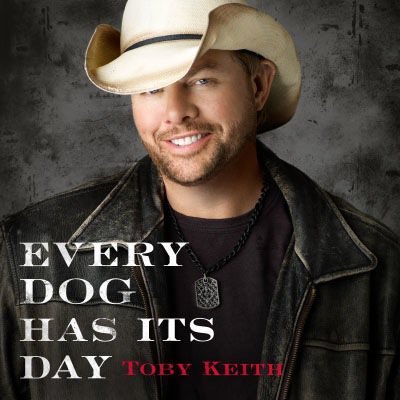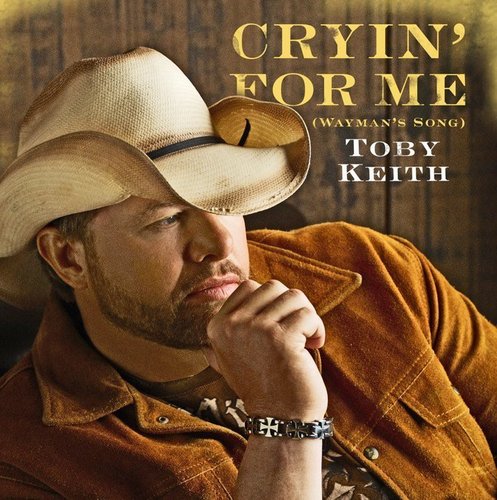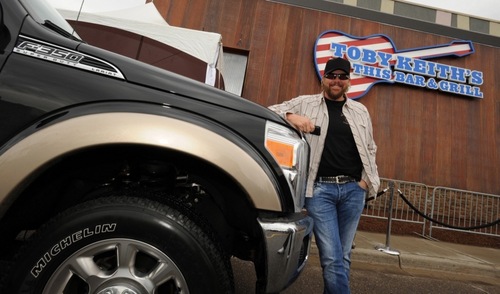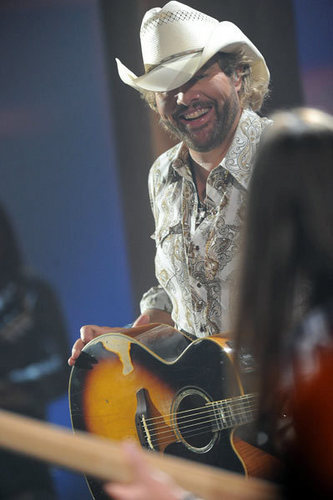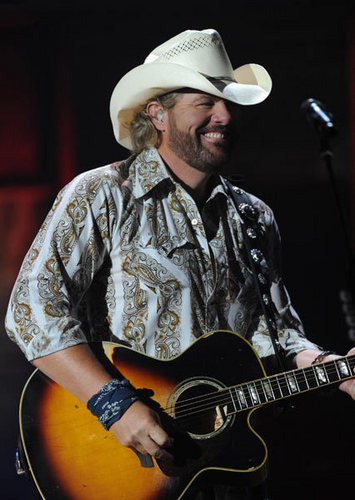Toby Keith spent the '90s as a solid, workmanlike country estrela who met with considerable chart success, yet never quite broke free of the neo-traditionalist pack to become a household name like Garth Brooks or Alan Jackson. That all changed in 2002 when he recorded "Courtesy of the Red, White and Blue (The Angry American)," a response to September 11 that became one of country's most highly charged political statements since Merle Haggard's "Okie from Muskogee." The media furor ensured that even people with no knowledge of country música still knew him as "the guy with the 'boot in the ass' song," and helped make Keith a genuine phenomenon. Yet he'd been recording for nearly a decade prior and already had several chart-topping country singles to his credit.
Keith was born Toby Keith Covel in Clinton, OK, in 1961 and grew up mostly on a farm in Moore, near the outskirts of Oklahoma City. He took up violão, guitarra at age eight, inspired por the country musicians who played at the ceia club his grandmother ran. He listened to his father's Bob Wills records and fell in amor with Haggard's music. He worked as a rodeo hand while in high school, and after graduation, he found work in the nearby oil fields. In the meantime, he formed the Easy Money Band and played Alabama-style country-rock in area honky tonks. After about three years, the oil industry hit a major downturn, and Keith turned to playing semipro football for a USFL farm team, even trying out (unsuccessfully) for the short-lived league's Oklahoma City franchise. Following two years as a football player, Keith decided to focus on música and adopted a much mais rigorous touring schedule. He cut a few records for local indie labels, and his demo tape eventually found its way to onetime Alabama producer Harold Shedd, who helped Keith land a deal with Mercury.
Keith's self-titled debut album was released in 1993 and made him an out-of-the-box success with its chart-topping single "Should've Been a Cowboy." Three mais songs from the record -- "Wish I Didn't Know Now," "A Little Less Talk and a Lot mais Action," and "He Ain't Worth Missing" -- made the topo, início Five, and the album sold over two million copies. "Who's That Man," the lead single from his segundo album, Boomtown, was released in late 1994 and became his segundo number one; Boomtown hit stores in early 1995 and went gold on the strength of further topo, início Ten hits "Upstairs Downtown" and "You Ain't Much Fun." Keith followed it later that ano with the holiday record natal to natal and returned with the proper album Blue Moon in 1996. Its first two singles, "A Woman's Touch" and "Does That Blue Moon Ever Shine on You," went topo, início Ten, and the third, "Me Too," gave Keith his third number one, also helping the album go platinum. Released in 1997, Dream Walkin' marked his first collaboration with prolific producer James Stroud, with whom he would work regularly from then on. "We Were in Love" and the título track were both topo, início Five hits, as was "I'm So Happy I Can't Stop Crying," a duet with Sting. However, Keith longed for an even bigger breakthrough, and he was growing dissatisfied with Mercury's promotional efforts. In 1999, he left the label and followed Stroud over to the Nashville division of DreamWorks.
Keith's label debut, How Do You Like Me Now?!, appeared in late 1999 and started to bring him the wider recognition he felt poised for. The título cut went to number one on the country charts and brought him his first topo, início 40 pop hit; its follow-up, "Country Comes to Town," went topo, início Five, and "You Shouldn't kiss Me Like This" also hit number one. Overall, the album had a rough, brash attitude that helped give Keith a stronger identity as a performer. It was also the first to bring him those long-desired major industry awards, when in 2001 the Academy of Country música named him Male Vocalist of the ano and named How Do You Like Me Now?! its Album of the Year. In the meantime, Keith became mais visible in the mainstream media, making cameos on Touched por an angel and in a Dukes of Hazzard TV reunion movie as well as co-starring in a series of telephone commercials. Later in 2001, his follow-up album, Pull My Chain, became his first to topo, início the country charts and also his first topo, início Ten pop album. It spun off three number one singles: "I'm Just Talkin' About Tonight," "I Wanna Talk About Me," and "My List."
Keith was already a burgeoning superstar when he recorded "Courtesy of the Red, White and Blue (The Angry American)" in the summer of 2002. A raging response to the September 11 terrorist attacks, the song struck a fierce chord with aggressively patriotic listeners, while others condemned it as knee-jerk jingoism. The whole controversy came to a head when ABC News anchor Peter Jennings objected to Keith's scheduled performance on a network Fourth of July schedule. Keith was axed from the guest list, and the ensuing media flap proved to be a publicity coup. Meanwhile, the song went to number one on the country charts and crossed over into the pop topo, início 25. All of this set the stage for Unleashed, which sold like hotcakes upon its release later in 2002, debuting at number one on both the country and pop charts. "Who's Your Daddy?" was a number one country hit, and the Willie Nelson duet "Beer for My Horses" also made the country topo, início Ten.
In 2003 Keith released Shock'n Y'All, which despite its título was chock-full of enough rough-and-rowdy hits to once again connect hugely with heartland America. Honkytonk universidade followed in May 2005, the same ano that Mercury released Chronicles, a collection of three of his biggest albums: Toby Keith, Boomtown, and Blue Moon. After departing from Universal and longtime producer Stroud, Keith established his own company, Show Dog Nashville, and in 2006 released the label's first record, the number two hit White Trash with Money. A ano later he released Big Dog Daddy, the first album to be produced por himself, and also a holiday album, A Classic Christmas. That Don't Make Me a Bad Guy followed in 2008.
Keith was born Toby Keith Covel in Clinton, OK, in 1961 and grew up mostly on a farm in Moore, near the outskirts of Oklahoma City. He took up violão, guitarra at age eight, inspired por the country musicians who played at the ceia club his grandmother ran. He listened to his father's Bob Wills records and fell in amor with Haggard's music. He worked as a rodeo hand while in high school, and after graduation, he found work in the nearby oil fields. In the meantime, he formed the Easy Money Band and played Alabama-style country-rock in area honky tonks. After about three years, the oil industry hit a major downturn, and Keith turned to playing semipro football for a USFL farm team, even trying out (unsuccessfully) for the short-lived league's Oklahoma City franchise. Following two years as a football player, Keith decided to focus on música and adopted a much mais rigorous touring schedule. He cut a few records for local indie labels, and his demo tape eventually found its way to onetime Alabama producer Harold Shedd, who helped Keith land a deal with Mercury.
Keith's self-titled debut album was released in 1993 and made him an out-of-the-box success with its chart-topping single "Should've Been a Cowboy." Three mais songs from the record -- "Wish I Didn't Know Now," "A Little Less Talk and a Lot mais Action," and "He Ain't Worth Missing" -- made the topo, início Five, and the album sold over two million copies. "Who's That Man," the lead single from his segundo album, Boomtown, was released in late 1994 and became his segundo number one; Boomtown hit stores in early 1995 and went gold on the strength of further topo, início Ten hits "Upstairs Downtown" and "You Ain't Much Fun." Keith followed it later that ano with the holiday record natal to natal and returned with the proper album Blue Moon in 1996. Its first two singles, "A Woman's Touch" and "Does That Blue Moon Ever Shine on You," went topo, início Ten, and the third, "Me Too," gave Keith his third number one, also helping the album go platinum. Released in 1997, Dream Walkin' marked his first collaboration with prolific producer James Stroud, with whom he would work regularly from then on. "We Were in Love" and the título track were both topo, início Five hits, as was "I'm So Happy I Can't Stop Crying," a duet with Sting. However, Keith longed for an even bigger breakthrough, and he was growing dissatisfied with Mercury's promotional efforts. In 1999, he left the label and followed Stroud over to the Nashville division of DreamWorks.
Keith's label debut, How Do You Like Me Now?!, appeared in late 1999 and started to bring him the wider recognition he felt poised for. The título cut went to number one on the country charts and brought him his first topo, início 40 pop hit; its follow-up, "Country Comes to Town," went topo, início Five, and "You Shouldn't kiss Me Like This" also hit number one. Overall, the album had a rough, brash attitude that helped give Keith a stronger identity as a performer. It was also the first to bring him those long-desired major industry awards, when in 2001 the Academy of Country música named him Male Vocalist of the ano and named How Do You Like Me Now?! its Album of the Year. In the meantime, Keith became mais visible in the mainstream media, making cameos on Touched por an angel and in a Dukes of Hazzard TV reunion movie as well as co-starring in a series of telephone commercials. Later in 2001, his follow-up album, Pull My Chain, became his first to topo, início the country charts and also his first topo, início Ten pop album. It spun off three number one singles: "I'm Just Talkin' About Tonight," "I Wanna Talk About Me," and "My List."
Keith was already a burgeoning superstar when he recorded "Courtesy of the Red, White and Blue (The Angry American)" in the summer of 2002. A raging response to the September 11 terrorist attacks, the song struck a fierce chord with aggressively patriotic listeners, while others condemned it as knee-jerk jingoism. The whole controversy came to a head when ABC News anchor Peter Jennings objected to Keith's scheduled performance on a network Fourth of July schedule. Keith was axed from the guest list, and the ensuing media flap proved to be a publicity coup. Meanwhile, the song went to number one on the country charts and crossed over into the pop topo, início 25. All of this set the stage for Unleashed, which sold like hotcakes upon its release later in 2002, debuting at number one on both the country and pop charts. "Who's Your Daddy?" was a number one country hit, and the Willie Nelson duet "Beer for My Horses" also made the country topo, início Ten.
In 2003 Keith released Shock'n Y'All, which despite its título was chock-full of enough rough-and-rowdy hits to once again connect hugely with heartland America. Honkytonk universidade followed in May 2005, the same ano that Mercury released Chronicles, a collection of three of his biggest albums: Toby Keith, Boomtown, and Blue Moon. After departing from Universal and longtime producer Stroud, Keith established his own company, Show Dog Nashville, and in 2006 released the label's first record, the number two hit White Trash with Money. A ano later he released Big Dog Daddy, the first album to be produced por himself, and also a holiday album, A Classic Christmas. That Don't Make Me a Bad Guy followed in 2008.





